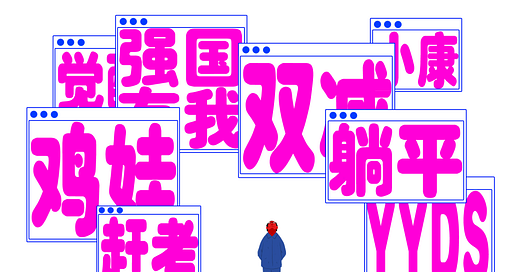#045: The Chinese words you need to know in 2021
Two year-end lists of popular slang and internet words
Welcome to RealTime Mandarin—a multimedia resource to immerse you in the latest Chinese language trends, inspire you to practice and improve your Mandarin every week, and empower you to communicate with confidence.
Subscribe now to get the next issue straight to your inbox!
Two year-end lists of popular slang and internet words were published on Monday and Wednesday. Here they are in Chinese:
Sohu: 2021年十大网络用语发布,“ 觉醒年代”“双减”等上榜 (top Internet words)
Yaowen Jiaozi: 《咬文嚼字》编辑部发布“2021年十大流行语” (2021 in 10 words - more interesting)
There are a total of sixteen words in both lists. I wrote about them in my favourite source of China news, SupChina!
See link to the article below.
I’m sticking with the ‘words of the year’ theme for this conversation in what you’ll read below:
My five favourite words from the year-end lists - taken from the SupChin article
Words that netizens say should be on the lists but weren’t
And some of the more interesting comments social media about the lists
Finally, in the recommendations at the end, I share another Substack newsletter for advanced learners of Chinese who want to improve their reading skills, which complements this newsletter nicely.
Enjoy!
1. WORDS OF THE YEAR
My favourite five
Nine of the sixteen ‘words of 2021’ were covered in this newsletter through the year.
I’ve included five of my favourites below. For the full list, and fuller explanations, check out the SupChina article, and there’s also archive links below if you still want more.
破防 pòfáng - Overwhelmed
网友们瞬间集体破防 - Netizens were instantly overwhelmed
Background: Originally from the gaming world, pòfáng refers to breaking through or tearing down the opponent’s defenses. It means emotionally overwhelmed, losing all control of emotions, being brought to tears. Pòfáng can be used in the negative, and also have positive connotations, meaning ‘deeply touched’ or moved to tears.
鸡娃 jī wá - Chicken babies
给孩子打鸡血,望子成龙、望女成凤的“虎妈”“狼爸”们为了孩子能读好书,不断地给孩子安排学习和活动,不停地让孩子去拼搏 - Tiger mothers and wolf fathers inject their children with chicken’s blood in the hope that sons will become dragons and daughters become phoenixes. Parents are continually signing their kids of for after-class tutoring and extra curricular activities so they can learn and compete.
Background: chicken (jī) comes from the colloquial expression dǎjīxiě 打鸡血 “injecting chicken’s blood”, which means giving yourself a pickup, motivating yourself or someone else, or plucking up the courage to do something you’d rather not. For parents and their kids, injecting chicken’s blood is to muster the courage to take the competitive pressures of schooling in China.
More: Reactions to three-child policy announcement, more in ‘chicken babies’, 5 June
赶考 gǎnkǎo - A quest to take on the challenges of a generation
踏上了实现第二个百年奋斗目标新的赶考之路 – [The Chinese people] have taken a step towards taking on the challenges of a generation in achieving [China’s] second centenary goal.
Background: gǎnkǎo meant to take the examinations to enter the civil service system in Imperial China. In 1949, Máo Zédōng 毛泽东 said: “Today is the day we enter Beijing and take the national examination” (今天是进京赶考的日子) at Xibaipo 西柏坡, a township in Hebei Province, where the Communist Party’s army gathered before its final assault on Beijing. In July 2013, Xi Jinping traveled to that town where he recalled Mao’s words, saying that although China had made great strides, and “stood up” in the intervening 60 years, there were still great challenges on the road ahead (赶考之路 gǎnkǎo zhīlù) that were far from over. In his speech for the 100th anniversary of the founding of the CCP this year, Xi again spoke of the need to maintain the spirit (赶考之心 gǎnkǎo zhīxīn, or 赶考精神 gǎnkǎo jīngshén) of taking on “tests” facing the next generation.
野性消费 yěxìng xiāofèi - Wild consumption
老板的劝告也阻挡不了善意网友野性消费的热情 - The plea from the boss could not stop the wild consumption and passion of netizens.
我看不懂,但我大受震撼 wǒ kàn bùdǒng, dàn wǒ dàshòu zhènhàn - I didn’t get it, but I was in awe
这条信息我看不懂,但我大受震撼 - [On seeing this information] I did not understand it but I was in awe.
Background: “I didn’t get it, but I was in awe” is how Taiwanese-American film director Ang Lee (李安 Lǐ Ān) described his reaction when watching the 1960 movie The Virgin Spring in an interview for a 2013 documentary about its director, Ingmar Bergman. The phrase has crossed over into mainstream use in China, describing confusion, shock, or being totally lost.





